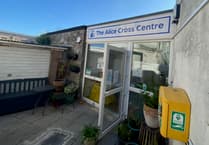THE tombstone of celebrated Teignmouth marine artist Thomas Luny desperately needs restoration.
The tomb of the artist – also of his half–brother Capt James Wallace, who served under Lord Nelson – at St James' churchyard is in some places eroded and the stone plinth falling away.
Iron railings that once surrounded the tomb are long gone.
The final resting places of William Mackworth Praed, 18th century MP for Exeter, his son William, Sergeant-in-Law and his daughter Elizabeth at the family tomb at St James also need attention.
William Mackworth Praed founded the Exeter Bank in 1769 and instigated the building of the Royal Clarence Hotel. He leased Bitton House, Lower Bitton, in 1792 as a pleasant summer residence for himself and his family.
William jnr, was by profession an attorney and had become Sergeant-at-Law. Winthrop Mackworth Praed, poet and MP, was William snr's youngest son. He was born in London in 1802 and brought up after the death of his mother in 1810 by his elder sister, Elizabeth.
Winthrop passed most of his childhood at Teignmouth, suffering from the family tendency to ill health. Many of his poems refer to the town, which he regarded as home.
The state of the tombs dating back more than 200 years was highlighted by Cllr Sylvia Russell at Teignmouth Town Council Finance and General Purposes Committee.
'When church graveyards are closed, maintenance is undertaken by the district council but there are some graves there that need more attention from time to time, two of which are very important to Teignmouth's history.
'The amount of work needed is over and above statutory duty and we need to look at how we go about the restoration and repair because these graves, like everyone's, are special,' she said.
Cllr David Cox clarified that it was for civic rather an ecclesiastical reasons. Cllr Roy Phillips said that there are other graves of good people in Teignmouth that have been left to fall into disrepair. He said that the cemetery left 'a lot to be desired'.
Cllr Dick Petherick said that research would have to be done to find any relatives that may take on the maintenance. But he urged caution. 'Where do we stop, we can't do everything?' he said. The council agreed to contact the Rev Phillip Luff to discuss the costs and a possible contribution for restoration.
l Thanks to Extracts from a History of Teignmouth by Grace Griffiths, 1973.

.jpeg?width=209&height=140&crop=209:145,smart&quality=75)

